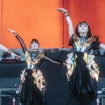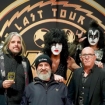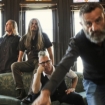Tool appear on the cover of Revolver's Aug/Sept issue, which is available on newsstands now. You can also grab the Tool issue and pre-order a limited-edition box set that includes four alternate covers via our webstore.
"It's pretty weird to me that our music is as popular as it is." So says Tool drummer Danny Carey as he ponders the fact that his band has sold millions of records, won multiple Grammy Awards and continues to sell out huge venues around the globe. You can't fault his logic: For a heavy band that seems to bask in unorthodox song structures, unusual time signatures, lengthy running times and often deliberately ambiguous lyrical content, it seems almost miraculous that Tool enjoy such a fruitful career. But it's perhaps that very paradox that has also allowed them to take 13 years to release an album without any discernible decline in interest amongst their notoriously zealous fan base. "Our fans are loyal as can be, that's for sure," Carey nods. "Our crowds seem to keep growing whether we put out a record or not, so I feel very lucky to have that support."
But it's not like our man has been idle during Tool's downtime. In addition to becoming a father, Carey started playing alongside Brent Hinds of Mastodon and Jonah Hex director Jimmy Hayward in the psych-rock supergroup Legend of the Seagullmen, whom he says are working on a new album. ("I just laid down drum tracks for two new songs," he reveals.) He also wrote the foreword to the 2009 coffee-table tome The Wickedest Books in the World: Confessions of an Aleister Crowley Bibliophile, which features many Crowley first editions from Carey's personal collection. We recently spoke with him about band chemistry, the creation of Fear Inoculum and his lifelong interest in the occult.

WITH SO MUCH TIME PASSING BETWEEN ALBUMS, WAS THERE A SENSE THAT YOU GUYS NEEDED TO RECONNECT WITH EACH OTHER TO WRITE THIS RECORD?
DANNY CAREY Somewhat, but it comes pretty easily. The chemistry is always there between the four of us, so we kinda count on that. But we try to keep growing and learning our craft. It's always interesting trying to fit your new process together with each other, so it keeps evolving. But it wasn't like we had to put extra effort in to get along with each other or anything like that — we can always count on that being there. But we expand our vocabularies, and you wanna use things in the tunes that you've been working on, so it's always interesting to find ways to make them function with each other in a harmonic way.
WHAT DO YOU SEE AS THE PROS AND CONS OF WRITING OVER AN EXTENDED PERIOD OF TIME AS OPPOSED TO DOING IT IN A MORE COMPRESSED WAY?
Well, you kinda end up getting lost, like, what's that expression? Can't see the forest for the trees? You get so involved in details that it gets kinda ridiculous. That's the con part of it. But a chance to fine-tune things with such precision just comes over time, so that would be one of the pros, for sure. Having time to work on textural things and paying attention to detail a little more would be the advantage to taking as much time as we did.
WHEN THE LAST TOOL ALBUM CAME OUT, GEORGE W. BUSH WAS PRESIDENT, FACEBOOK AND TWITTER WEREN'T YET AVAILABLE TO THE PUBLIC, AND INSTAGRAM DIDN'T EXIST. IN THAT SENSE, DO YOU FEEL THAT TOOL IS RE-ENTERING A COMPLETELY CHANGED WORLD WITH THIS RECORD?
Wow, that's funny. [Laughs] It's been a while. It does feel like that. I can tell in our crowd. Most of them are the old faithful fans, but some of them are hearing it through their parents. It's funny that there's a whole generation out there now that we can try to win over, that weren't even there because we took so long. But it's kinda challenging and it makes me feel really good that it seems to be working really well still. I'm excited about that, and I'm kinda glad that we did take a while and give ourselves a chance to grow and evolve a little bit so the new songs are fresh to us, and it's inspiring to go out and share it with people.
HOW HAS THE SOCIAL MEDIA AGE AFFECTED TOOL GENERALLY, AND YOU PERSONALLY?
I really don't know. [Laughs] It must've helped our popularity somewhat because our shows are selling out quicker than ever. But I'm not really sure how to be the judge of something like that. I just let it run its course. I really don't do too much posting so I'm not really involved with it as much as probably Maynard or Adam, I suppose.
THE SONGS ON THE NEW ALBUM ARE REALLY LONG. WAS THAT INTENTIONAL?
They pretty much just ended up that way. There were times when I thought, OK, this is getting kind of ridiculous. [Laughs] I was a bit worried about it, because I kinda like the contrast of having short songs and long songs, but all of them ended up being really long. So I had to step back and go, "If this is where we are as a band and this is where we're meeting, I just have to accept it." I try to look at it as movements within an individual song and the overall piece is a symphony or something. As long as it's moving forward and progressing and keeping people's attention, I'm not too worried about the length.

WHAT IS THIS NEW ALBUM ABOUT FOR YOU?
Well, I suppose the main overview of it is getting older and more comfortable with yourself. That seems to be the result. I mean, it's called Fear Inoculum, so it's kind of like being able to choose your fears and making them work for you rather than actually living in fear. You grow through that, and as you get older you kinda don't give a shit. I mean, I'm not afraid of anything — or what people would think of my playing. It's kind of an evolution in that way, getting through and getting over criticisms and our fears of various kinds, I suppose.
YOU, ADAM AND JUSTIN ARE CREATING THIS MUSICAL FOUNDATION THAT MAYNARD COMES IN AND PUTS WORDS TO. HOW IMPORTANT IS IT FOR YOU TO BE ABLE TO STAND BEHIND THE LYRICS?
It's very important, but Maynard's never let me down once. It all has to fit together. Maynard has come to me several times, especially when we first lay the music on him, because he wants to know some of the math and some of the concepts that maybe we had about the songs as they're taking form. So it's still kind of a group effort. But his opinion is the final one. He can do whatever he wants on it, but he comes to us for little leads or direction sometimes, so it is cohesive.
YOU MENTIONED MATH. YOU GUYS ARE KNOWN FOR YOUR USE OF SACRED GEOMETRY IN YOUR ARTWORK, VIDEOS AND EVEN MUSIC. HOW DOES IT PLAY A ROLE IN THIS RECORD?
This has been a real seven-based record for some reason. We just kinda fell into that with the music, but all the artwork has been set up around sixes evolving into sevens. It's kind of the next step of our stage in evolution. You can't just sit down and draw a seven-sided figure with a compass. You have to figure out the angles and think about it. So there is a little more thought put into these songs. That would be the geometry theme of this album, if anything.
MANY TOOL FANS KNOW ABOUT YOUR INTEREST IN ALEISTER CROWLEY AND THE COLLECTION OF HIS BOOKS THAT YOU HAVE. DOES ANY OF THAT FIGURE INTO THIS RECORD?
There's not so much inspiration from the Crowley stuff in the beats as maybe there was in the past. I think it was more some of the older alchemist things — earlier works from the 1400s and things were more of an influence than the Crowley stuff.

ANYTHING SPECIFIC YOU COULD POINT TO?
I've been getting into John Dee a lot. He's one of my favorites from that era. I bought a couple of his more recent works ... or recent reprints, I should say. [Laughs] He hasn't written anything for quite some time.
WHAT DO YOU THINK IT WAS THAT INITIALLY DREW YOU TO THAT STRAIN OF LITERATURE?
I think it was my dad. He was a master Mason and all this stuff, so he was always into the Freemasonic writings. We always had it around the house, and I was always fascinated with it. I was attracted to it, so I just went for it. He didn't do anything to hide it from me by any means. He helped push me that way, which I'm really indebted for.
THE SECRET SOCIETY ASPECT MUST'VE BEEN ESPECIALLY APPEALING TO YOU AS A KID.
Oh, absolutely. I always wanted to crack that nut. I was definitely intrigued. If anyone is trying to keep a secret, I wanted to find out what it is. [Laughs]
IT FEELS LIKE THAT'S WHAT TOOL FANS ARE CONSTANTLY DOING — MINING THE MUSIC AND LYRICS AND ARTWORK FOR HIDDEN SIGNS AND SYMBOLS AND MESSAGES. WHAT DO YOU THINK ABOUT THAT ASPECT OF TOOL FANDOM?
We do it intentionally. Mystery is everything. That's why we didn't hardly make any pictures of ourselves known early on. I always thought that was the coolest thing. Pink Floyd and Yes and some of the old art-rock bands, you didn't know what they looked like. You were always looking for pictures, and that added to the mystique. It's much more interesting when you're forced to imagine or guess at these things because usually it's better than reality. [Laughs] So you wanna take people's imaginations as far as possible. That's one of the goals.
JUSTIN HAS BEEN IN THE BAND SINCE 1995, AND THE REST OF YOU HAVE BEEN TOGETHER EVEN LONGER. WHAT DO YOU THINK IT IS ABOUT THIS COMBINATION OF MEMBERS THAT MAKES IT WORK?
The friendship was really important in the beginning. To get in the van and go thousands of miles and just deal with each other when you're on top of each other is not an easy thing for any band. We're lucky that when we've had our difficulties, we could always see the prize — the carrot on the stick — so that kept us together for a long time, too. When times are rough, there's gotta be a motivating factor. But then just the results when we get in a room and make music together or make albums or play our concerts — it's so satisfying that it takes care of itself almost. There's nothing I'd rather do with my time than work with my guys, that's for sure. I do love my job.
BEYOND BEING THE DRUMMER, DO YOU HAVE ANOTHER ROLE IN TOOL?
I guess maybe enforcer. [Laughs] I used to have to be the hatchet man when we had to fire people. But our crew is so awesome now that they take care of themselves. No one can even infiltrate the family, so they usually weed them out before I have to do anything. We all kinda have different roles, I guess, but mine really is more like the music director. I try to take part in a lot of the arranging, but we all do a bit of that. But I studied more music in school, so sometimes I can get my opinion across a little easier so it makes more sense.
WERE YOU THE ENFORCER BECAUSE YOU'RE THE BIGGEST?
[Laughs] Yeah, I think it was as simple as that. It just made sense.

LIKE ADAM, YOU'VE BECOME A FATHER SINCE THE LAST ALBUM. HOW HAS THAT AFFECTED YOUR APPROACH TO TOOL, AND LIFE IN GENERAL?
It puts a higher value on your time, that's for sure. You don't wanna be piddling around with things when you could be with your son. That's the biggest change that's happened in my life. I try to be more efficient time-wise and try to make things worthwhile so I'm not taking away from any time that I can give to him. It's definitely been a priority. My life completely changed when that little guy was born.
IF YOU HAD YOUR CHOICE, WHAT WOULD YOU WANT THE LISTENER TO GET OUT OF THE NEW ALBUM?
Musical inspiration, I suppose. My goal has always been that — to transport people to a better place through the beauty of music and art. To inspire and provoke thought. I think good art always does that — it does to me, anyway. I love going to galleries and museums and getting motivated in that way, so I hope to be able to return the favor.












